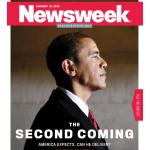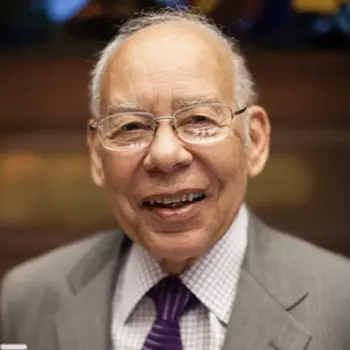Since the rule of law was upheld in the courts of New York on Thursday, May 30, 2024 and a jury of his peers convicted the forty-fifth President of the United States, Donald J. Trump, on 34 counts of felony—there have been numerous responses to the verdict from evangelicals. While these events have unfolded and as I’ve taken in the evangelical responses to them, I have been rereading and reflecting on the significance of James K. A. Smith’s book, You Are What You Love (Brazos Press, 2016), a book published months after Trump took office. Why? Smith’s book, You Are What You Love, has helped me understand the evangelical response to the Trump verdict.

The premise of Smith’s book is that we are liturgical creatures of habit, whose desire and ultimate end is to love. What we love forms or de-forms us, depending upon the nature of that love. Smith argues that de-forming secular liturgies surround us that tell us a substitute and counterfeit story of love. One of those many liturgies has to do with consumption.
Smith says that this secular liturgy deceives us in many ways. The ideal advertising images of the good life make us think we can fix our broken lives if we just had the goods they advertise. This deceives people into an unending cycle of consuming goods and services that they think might save them and fix their problems. Yet, these goods become obsolete or out of fashion, forcing us to dispose them for new goods. And the conclusion of a service or experience requires us to seek another one even more exclusive or superior.
Possessing the tangible, finished product tricks us into forgetting the invisible processes of resource and labor exploitation that brought that good into being. While tailoring consumer decision making to our own tastes and preferences entails individualism, the experience of shopping involves others but often towards the end of comparison and competition. We compare and compete with one another for status designated by the goods we accumulate or the exclusive services we experience.
While the deceptive allure and corruptive power of consuming goods and services seem apparent to us, there is no escaping the fact that we are embedded in a capitalistic system that requires us to labor for resources that permit us to purchase goods and services, which ensure our survival. Our resource rich environment, while being rapidly depleted through industrialization, has made it possible for many, who have an abundance of disposable resources, to massively consume goods and services that cater to their values and worldview.
One of those value and worldview driven conglomerates of goods and services is Brand Evangelicals, which is undergirded by an entire industrial complex, coined by Skye Jethani as the Evangelical Industrial Complex. The existence of Brand Evangelicals and its industrial complex entails a convergence and blurring between the secular liturgy of consumption and the sacred Christian liturgy that Smith champions, for evangelicals have built a brand and industry out of the evangelical story.
The evangelical brand and industry is a sort of kingdom vision in and of itself. As Smith puts it, “To be human, we could say, is to desire the kingdom—some kingdom…we all live and long for a social vision of what we think society should look like too” (Smith, You Are What You Love, 11). The social vision of Brand Evangelicals looks like something. Whatever it is, it is desirable to them and signifies their vision of human flourishing and the good life.

This is why the philosophical, theological, and cultural premises of Smith’s book undergird my research on Brand Evangelicals. If we are what we love, how we use our time and spend our resources objectively indicate what are our habit forming loves. Consumption of the evangelical brand is formative, just as Smith argues, and it produces reflexive responses to our world. Since reflexive responses to the world indicate what evangelicals value and love, then major events that dramatically affect the lives of evangelicals become valuable moments to get a pulse on what values are forming and fashioning the evangelical brand.
The felony conviction of Donald Trump is just one such moment that helps us put a finger on the pulse of the evangelical heart. And, if we take Smith’s argument seriously, that the heart is the control center of our being, then getting the pulse of the evangelical heart is of great consequence to us.
Mind you that Mark Noll’s emphasis on the Scandal of the Evangelical Mind may have inadvertently caused evangelicals to inordinately put too much stock in an intellectualist tradition, one to which evangelicals historically do not adhere. Part of the story of evangelicals is that they are heart religion people. The pietist and mystical impulses that emigrated from Continental Europe into the affections of early evangelicals played a crucial role in stimulating the transatlantic evangelical revival of the eighteenth century. Merely look to the intellectual father of evangelicals, Jonathan Edwards, and note that his pinnacle reflection on the revival consisted of an exploration on how an individual might perceive genuine religious affections within herself or himself (Religious Affections, WJE, Vol. 2).
All that said, if you’re an evangelical, you may wish to examine your embodied, emotional, and social response to the verdict of Donald Trump and consider what that means about what has discipled or catechized you. Your visceral and instinctual response to this news points to what you really long for and desire. You may also wish to look at signature evangelical leaders’ responses to the Trump verdict to compare notes and get a read on how attuned your heart is to those who sit at the heart of the evangelical movement.
Let’s take, for instance, the opinion editorial, “The Verdict Is In”, at World Magazine from Albert Mohler, President of The Southern Baptist Theological Seminary in Louisville, Kentucky. Mohler’s response to the verdict helps us get a pulse on the heart of evangelicals, and I aver that your response to his article also pinpoints much about what you think and feel about the evangelical brand.
Mohler argues that the verdict is “a major turning point in American history.” I am not surprised that he believes this, nor am I inclined to disagree with his perspective. But I’d like to qualify this by noting that historians normally require more time to pass, in order to create critical distance from an event, which makes it possible to distinguish the importance of one event from any other rival turning point. After all, it is tempting for people to hyperbolize and sensationalize moments in history with the turning point construct.
Essential to a turning point is an irreversible outcome that forever changes the course of the subject you are studying. Once again, failing to permit substantial time to pass, after an event, may lead to falsely calling a reversible event a turning point. For instance, it now would be embarrassing to call Al Mohler’s tweet “Never. Ever. Period” a turning point for him.
Never. Ever. Period.
— Albert Mohler (@albertmohler) May 4, 2016
Nonetheless, Mohler’s assertion that this is a turning point in American history checks out when we consider his theological and cultural commitments, the argument of his opinion editorial, and the nature of the turning points construct. Here’s why. Turning point histories have predominantly been male biased.
The medievalist, Caroline Walker Bynum, remarks, “Women tended to tell stories and develop personal models without crises or turning points” (Bynum, Holy Feast and Holy Fast, 25). Mark Noll’s Introduction to the third edition of his Turning Points book admits to the traditionally male bias of turning point histories. “That it is mostly men who figure as the principal actors in the turning points that follow is less a statement about the intrinsic character of the faith than it is a reflection of how the church’s public life has been documented through the centuries” (Noll, Turning Points, 10). The notion of turning points is the product of what Herbert Butterfield called Whig history, history centered on writing about great men by great admirers, who all happened to be white, male, and normally reformed protestants.
So then we should not be astonished when Mohler centers the toxically masculine Trump as a victim of a “show trial”, elevates Trump’s discretion that “he doesn’t confuse male and female”, downplays the abusive and destructive behavior of Trump’s sexual scandals, and calls it all a “major turning point in American history.” For Brand Evangelicals like Al Mohler, there is no turning back. Protecting and preserving the American value of patriarchy is more critical than prosecuting predators. Mohler prefers to belittle the rule of law and our judicial system than give ground on evangelical political and cultural power.
Is this Trump verdict the evangelical Scopes trial of the twenty-first century and a turning point in the history of Christianity in the United States? We shall see. From Mohler’s perspective, it is.
Elesha Coffman recently published her own Turning Points in American Church History (Baker Academic, 2024). In her Introduction she writes:
Like any author, I have opinions about the topics I write on. My opinions inform my perspective, as does my demographic identity. I can write only as the person I am: a white, English-speaking, American Protestant woman, born in what is often called “the year of the evangelicals.” But perspective differs from partisanship. (Coffman, Turning Points in American Church History, 6, emphasis added)
I’d like to think that Mohler’s perspective, and that of World Magazines, is unencumbered by partisan loyalties. However, my gut says that the typical evangelical response to the Trump verdict is driven by partisan loyalties rather than a kingdom ethic of love.
If you wish for a fair and thoughtful reporting on the landscape of the evangelical response to the Trump verdict, I commend to you the excellent reporting from Harvest Prude at Christianity Today, “Guilty Verdict Shakes Trump Supporters Faith—in the Justice System.”
 Joey Cochran (Ph.D., Trinity Evangelical Divinity School) is the General Editor of the Anxious Bench and the Social Media Coordinator for the Conference on Faith and History. He has taught at Wheaton College, Trinity Evangelical Divinity School, and Trinity Christian College. Cochran is the author of the forthcoming book from Brazos Press, Brand Evangelicals.
Joey Cochran (Ph.D., Trinity Evangelical Divinity School) is the General Editor of the Anxious Bench and the Social Media Coordinator for the Conference on Faith and History. He has taught at Wheaton College, Trinity Evangelical Divinity School, and Trinity Christian College. Cochran is the author of the forthcoming book from Brazos Press, Brand Evangelicals.













